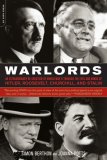Summary | Excerpt | Reviews | Beyond the Book | Readalikes | Genres & Themes | Author Bio
An Extraordinary Re-Creation of World War II Through the Eyes and Minds of Hitler, Churchill, Roosevelt, And Stalin

Critics' Opinion:
Readers' Opinion:
First Published:
Mar 2006, 358 pages
Paperback:
Apr 2007, 384 pages
 Book Reviewed by:
Book Reviewed by:
BookBrowse Review Team
Buy This Book
No one was going to restrain him over Poland and his generals
had told him he must attack before the autumn rains came. Only one thing stood
in his way: Britain and France had said they would go to war for Poland, raising
the specter that the Soviet Union might also turn against him and propel him
into a war on two fronts. This was the very thing imprinted in Hitler’s mind
as having helped to lose Germany the First World War 20 years before.
Now in the pure air of the mountains, Hitler began to think
the unthinkable—a pact with his greatest ideological enemy. In August 1939 he
put out feelers to Moscow.
Not surprisingly Stalin was deeply suspicious of Hitler’s
approach. He kept him waiting, spending hours reading Mein Kampf, Hitler’s
autobiography and manifesto written fifteen years before, underlining key
passages; among them Hitler’s views of the early Bolshevik leaders, men like
Stalin himself: "Never forget that the rulers of present-day Russia are
common blood-stained criminals, that they are the scum of humanity."
But Stalin could see that Hitler was now desperate for a deal
and offering to send his foreign minister, Joachim von Ribbentrop, to Moscow.
The British and French, by contrast, who were also courting him, had only
managed to send a delegation of generals and admirals to Moscow. Stalin decided
that Hitler’s offer was too enticing to resist and invited Ribbentrop to
Russia. Goebbels, aware of the fearful prospect of a two-front war, noted in his
diary: "Non-aggression pact with Moscow perfect. Ribbentrop in Moscow on
Wednesday. That is something! We’re on top again. Now we can sleep more
easily."
On 23 August Ribbentrop landed in Moscow. Shortly after
midnight on the morning of the 24th the Nazi–Soviet pact was signed and with
it a secret protocol under which Germany and Russia would carve Poland into two.
Hitler phoned Ribbentrop: "This will hit like a bombshell." But as
Goebbels noted, it was not strength but fear of Stalin knifing him in the back
that had forced Hitler into history’s biggest U-turn: "The Führer
believes he’s in the position of scrounging for favours and beggars can’t be
choosers. In times of famine the devil feeds on flies."
In the Kremlin, Stalin proposed a cynical toast to Ribbentrop
and the pact with the Nazis: "I know how much the German nation loves its
Führer; I should therefore like to drink his health."But like Hitler,
Stalin was also acting from fear, in his case that Hitler would attack him. That
evening he told his inner circle: "Of course it’s all a game to see who
can fool whom. He thinks he’s outsmarted me but actually it’s I who’ve
tricked him." There was a curious postscript to the celebrations. Hitler
had sent his personal photographer, Heinrich Hoffman, to film Stalin’s
earlobes to see whether they were "ingrown and Jewish, or separate and
Aryan." They were separate; Stalin passed Hitler’s test.
Stalin had found a bedfellow for whose cunning he had held a
long and sneaking admiration. Back in 1934, he had observed Hitler eliminate his
rivals within the Nazi party in the so-called night of the long knives and
remarked: "Did you hear what happened in Germany? Some fellow that Hitler!
Splendid! That’s a deed of some skill!" Hitler had felt no such mutual
admiration. In his early years in power he was set on the dreams of Mein
Kampf: an alliance with Britain’s sea empire while he expanded to the east
and built his German land empire on the continent. Only when that plan had
clearly failed did Hitler begin to see in Stalin someone with whom he might one
day do business.
Stalin was the first of the two to be a mass murderer. In May
1937 as his terror began to move into top gear, he compared his victims with the
boyar landowners massacred by Ivan the Terrible 400 years before:
"Who’s going to remember all this riff-raff in ten or 20 years time? No
one. Who remembers the names now of the boyars Ivan the Terrible got rid
of? No one." A week before he invaded Poland, during a conference with
his generals Hitler made an eerily similar remark: "Genghis Khan had
millions of men and women killed by his own will and with a gay heart. History
sees him only as a great state-builder. … And who, after all, speaks today of
the annihilation of the Armenians?"
Reprinted from Warlords, Copyright 2006. Reprinted by permission of Da Capo Press.





The Flower Sisters
by Michelle Collins Anderson
From the new Fannie Flagg of the Ozarks, a richly-woven story of family, forgiveness, and reinvention.

The House on Biscayne Bay
by Chanel Cleeton
As death stalks a gothic mansion in Miami, the lives of two women intertwine as the past and present collide.

The Funeral Cryer by Wenyan Lu
Debut novelist Wenyan Lu brings us this witty yet profound story about one woman's midlife reawakening in contemporary rural China.
Your guide toexceptional books
BookBrowse seeks out and recommends the best in contemporary fiction and nonfiction—books that not only engage and entertain but also deepen our understanding of ourselves and the world around us.